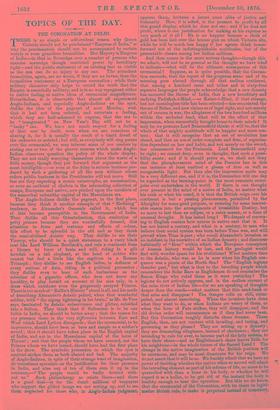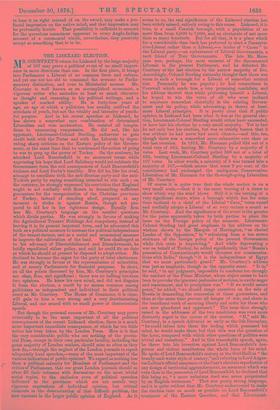TOPICS OF THE DAY.
THE CORONATION AT DELHI. THERE is no simple or self-evident reason why Queen Victoria should not be proclaimed "Empress of India," or why the proclamation should not be accompanied by certain stately or even grandiose formalities. Her Majesty is Empress of India—is, that is, Sovereign over a number of persons who exercise sovereign though restricted power by hereditary right—and the public statement of an existing fact as visible as the sun can do no injury to any one. The attendant formalities, again, are no worse, if they are no better, than the ! formalities customary at a European coronation ; while their military character only helps to record the truth that the ! Empire is essentially military, and is in no way repugnant either to native feeling or native ideas of ceremonial magnificence. I Nevertheless, it is observable that almost all experienced Anglo-Indians, and especially Anglo-Indians on the spot, dislike the idea of the pagcant of next Monday, wish' that it had not been ordered, and entertain a feeling, which they are half-ashamed to express, that the era to , be " inaugurated " on New Year's Day will not be a ' " lucky " one. We have not much respect for a feeling of that sort by itself, even when we are conscious of sharing it, for it is usually the result of a timid dread of the unknown or untried ; but still, as everybody will sing pans over the ceremonial, we may interest some of our readers by stating one or 'two of the graver reasons which make Anglo- Indian observers question the policy of the whole display. They are not really worrying themselves about the waste of a little money, though they put forward that argument as the most intelligible ;—or even at the delay in serious business pro- duced by such a gathering of all the men without whose orders public business in the Presidencies will not move. Still less are they expecting a scenic catastrophe, an assassination, or even an outburst of cholera in the astounding collection of camps, European and native, now pitched upon the outskirts of the somewhat unhealthy capital of the Mussulman era.
The Anglo-Indians dislike the pageant, in the first place, because they think it another example of that " Medizing " tendency, as Alexander's Generals called it, which has of late become perceptible in the Government of India. They dislike all this Orientalisation, this exaltation of petty princes because they are wonderfully dressed, this attention to form and costume and effects of colour, this effort to be splendid in the old and as they think the semi-civilised Asiatic way. They dislike to see their Viceroy, who should be a quiet statesman in a rusty black coat like Lord William Bentinck's, and rule a continent from a library by force of brain and will, riding in a gilt howdah on a tall elephant, at the head of nobles who cannot but feel a little like the captives in a Roman Triumph ; they dislike to see English ladies, in defiance of every custom of Asia, riding in a political procession ; they dislike even to hear of such barbarisms as the selection of a gigantic officer, who does not know any heraldry, to play herald on account of his size only, in a dress which outshone even the gorgeously arrayed Princes. There is too much of " Rollin's History " about it all, and his mode of describing Alexander's Asiatic period, when that wonderful soldier, with " the zigzag lightning in his brain," as Mr. de Vere says, fascinated by Asiatic subservience and glitter, subsided into a Sultan. They think that if Sultanism is to be our foible in India, we should be better away ; that the reason for our presence there is the very differentia between East and West which Lord Lytton disregards ; that the ceremonial, to be impressive, should have been as bare and simple as a soldier's sword ; that it should have taken place in the English capital of India, and not in the Mussulman capital of the heirs of Timour ; and that the people whom we have rescued, not the Princes whom we have tamed, should have had the first place in the show. The symbolic procession in which the ryot is omitted strikes them as both absurd and bad. The majority of Anglo-Indians, in spite of their strange want of imagination, do sometimes speculate on the justification for their presence in India, and nine out of ten of them sum it up in the sentence,—" The people would be badly treated with- out us." Such philanthropy as exists there—and thew is a good deal—is for the dumb millions of taxpayers who support the gilded image we are setting up, and to see them neglected for those who, in Anglo-Indian judgment, oppress them irritates a latent sense alike of justice and humanity. How, it is asked, is the peasant to profit by all this grand display, which he does not see ; and if he does not profit, where is our justification for making at his expense so very much of it all ? He is no happier because a cloth of / gold has been laid over the bronze gun on which Victoria sits, / while he will be much less happy if her agents think hence- forward not of the indistinguishable multitudes, but of the presentable classes among her Indian millions.
And then comes in the more serious thought—though this- / we admit, will not be so general as the thought we have tried , to indicate—what will be the ultimate consequence of this ceremonial ? Suppose, as is quite possible, that the Corona- tion succeeds, that the report of the gorgeous scene and of its meaning goes abroad through all that endless continent, that among a hundred races and tribes and in sixty-four separate languages the" people acknowledge that a new dynasty has mounted the throne of India, that a new hereditary and undying Padishah-i-Hind,—or Kaiser-i-Hind, if that strange, but not meaningless title has been selected—has remounted the throne of Baber, and now claims as of legal right, and not merely out of success in war, the allegiance of the two hundred millions within the secluded land, what will be the effect of that impression, when successfully brought home to their minds ? It may be, we presume Lord Beaconsfield thinks it will be, that the whole of that mighty multitude will be happier and more con- tent; that it will recognise that an era of revolution has closed, and that an era of order complete and firm, of organisa- tion dependent on law and habit, and not merely on the sword, has commenced for the Peninsula. Lord Beaconsfield may be right ; we cannot deny, even in thought, that such a possi- bility exists ; and if it should prove so, we shall not deny that the phosphorescent mind of the Premier has in this one instance at least emitted a gleam of true as well as recognisable light. But then also the impression made may be a very different one, and if it is, the Coronation will one day be regarded as the turning-point in the most romantic enter- prise ever undertaken in the world. If there is one thought ever present in the mind of a native of India, no matter what his rank or what his creed, it is that the British reign over his continent is but a passing phenomenon, permitted by the Almighty for some good purpose, or entering for some inscrut- able reason into the arrangements of irresistible Destiny, but no more to last than an eclipse, or a rainy season, or a time of unusual drought. It has lasted long? We despair of convey- ing to English readers how untrue in native ears that is. It has not lasted a century, and what is a century, to men who believe their social system was born before Time was, and will prevail when Time is past ; who recall Alexander's invasion as an incident in the narrative of an Indian dynasty ; and discourse- habitually of "Eras" within which the European conception of human history would be lost, and the geologist would find with wonder spate for his evolutions? What matters time to the Asiatic, who was as he is now when his English con- queror was a pirate of the North Sea? The "English legions thunder past," but what is that to the brooding people which remembers the Solar Race as Englishmen do not remember the Saxon Kings who ruled them as it were yesterday? The legions do not actively oppress, and in the endless current of the calm river of Indian life—for we are speaking of thoughts deeper than the creeds—what matters that this sand-bank or that arise and disappear ? The Ganges rolls on still, unim- peded, and almost unnoticing. When the invaders have done what they want to do, or when Indians are weary of them, or when the hour of Fate strikes, they will disappear, and the old divine order will recommence as if they had never been. But this Coronation roughly disturbs these dreams. These English, then, are not content with invading, and taxing, and governing as they please? They are setting up a dynasty ; they are demanding allegiance, instead of obedience ; they are intending to rule for ever, to become part of the holy system, to have their share—and an Englishman's share leaves little for his neighbour—in the whole future of the Sacred Land? The change in the native imagination of the British position will be enormous, and may be most disastrous for his reign. We do not assert that it will be so. We frankly admit that we have no power of deciding whether the native when so moved will admit the intruding element as part of his scheme of life, no more to be quarrelled with than a bone in his body, or whether he will regard it as a bullet, to be got rid of the instant the body is healthy enough to bear the operation. But this we do know, that the ceremonial of the Coronation, with its claim to legiti- matise British rule) to make it perpetual instead of transitory, to base it on right instead of on the sword, may make a pro- found impression on the native mind, and that impression may be profoundly hostile. That possibility is sufficient to account for the querulous uneasiness apparent in every Anglo-Indian account of a ceremonial which, nevertheless, they passively accept as something that is to be.



































 Previous page
Previous page